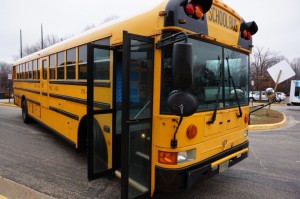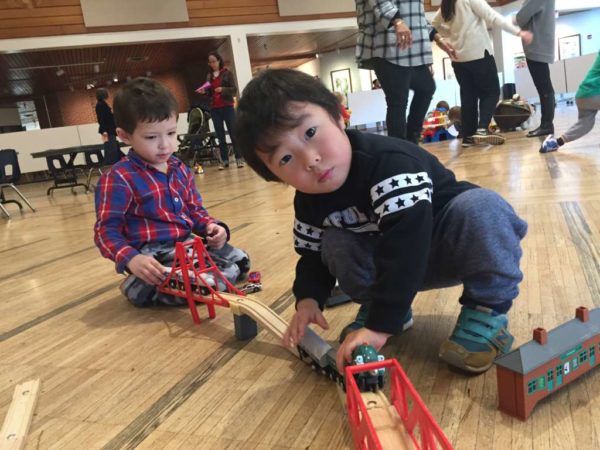A new preschool preparation program is coming to Reston Community Center on Tuesday mornings from Oct. 2 to May 14. Children can attend the free program with a parent or guardian and learn more about the tools, skills, and confidence needed to transition from home to school.
The program is made possible through RCC’s partnership with Fairfax County Public Schools and Home Instruction for Parents of Preschool Youngsters, a national program that partners with parents to help children transition to school. Adults will receive training and materials for reading, writing, language, math and motor development. Materials will be available in English and Spanish.
RCC’s executive director Leila Gordon said the program is a “vital resource” for area families. “The transition from home to kindergarten is a big leap into a brand new world. Preschool Prep will take the fear away and make sure that leap has a happy landing,” Gordon said.
During weekly meetings, adults and children will meet a HIPPY instructor to learn new skills and chart progress. Registration is open online.
Sessions will take place between 9:30-10:30 a.m. for three-year-olds. Two slots are offered for four-year-olds between 10:45 a.m. and 12:15 p.m. and between 12:30 p.m. and 2 p.m.
File photo
 This is an opinion column by Del. Ken Plum (D), who represents Reston in Virginia’s House of Delegates. It does not reflect the opinion of Reston Now.
This is an opinion column by Del. Ken Plum (D), who represents Reston in Virginia’s House of Delegates. It does not reflect the opinion of Reston Now.
I can remember the conversation almost word for word even though it occurred decades ago. The counselor in my high school asked me to come to her office, and there she told me it was time for me to start preparing applications to go to college. I was about to fall out of my chair. I explained to her that no one in my family had ever been to college, and there was no way that I could go. Most of my family had never finished high school. She told me that lots of people are the first in their families to go to college and that I could be such a person. I did not know what to answer; it was such a new idea that she proposed to me.
Secretly inside she had set ablaze in me a fire that would never go out. The excitement of the idea that I could go to college and learn about so many new things of which I had been curious was more than I could contain. I was skeptical, however, and I did not go to college the first year out of high school. The next year with lots of fear and trepidation I did start my education at a higher level, and I never have stopped.
From my Bachelor of Arts at Old Dominion College, now University, to my master’s in education at the University of Virginia to a thirty-year career with Fairfax County Public Schools, to the Plum Center for Lifelong Learning being named in my honor, to my teaching at George Mason University’s Osher Lifelong Learning Institute, education both formal and informal has been a fundamental part of who I am. I can still feel the excitement that I have had in being a part of so many different educational experiences.
All these reminiscences about my educational background came back last week as my grandson received his MBA from Virginia Tech. Growing up in a family where the highest educational achievement was a brother who graduated from high school, I now live in a family where I, my wife and our children and grandchildren have among us 14 college degrees with six of those degrees being beyond the bachelor’s level. I am honored to represent a district with constituents who are among the very best educated in the state.
Needless to say, education is among the highest priorities I have as a legislator. I want all students to have access to educational programs that will help them realize their highest potential. Fundamental to me is that our educational system leave all students with a quest for knowledge and the appropriate tools with which to pursue their interests. We cannot afford to have students not like school, nor can we ignore the fact that learning is a lifelong adventure. We have the institutions and the resources to make education at higher levels the best in the Nation. Virginia needs to join the states that are making community colleges free. Can we afford it? The answer is simply that we cannot afford not to!
 The International Baccalaureate Primary Years Program, which offers a trans-disciplinary framework could come to Dogwood Elementary School (12300 State Route 4721) soon.
The International Baccalaureate Primary Years Program, which offers a trans-disciplinary framework could come to Dogwood Elementary School (12300 State Route 4721) soon.
The school has been named a candidate for the program, effective March 1 2018, according to a new release issued by the school system. According to the program’s website, IB classes aim to nurture and develop students between 3 and 12 into “caring, active participants in a lifelong journey of learning.”
Two years ago, Belvedere Elementary School (6540 Columbia Pike) was the first Fairfax County public school authorized as an IB PYP school.
According to the school system, schools selected to participate in the program are driven by a common vision: a commitment to high-quality, challenging and international education.
The school will receive on-and-off-site consultation from the program. Teachers will have access to IB’s online curriculum center, which includes teaching materials and participation in online forums. Since its introduction in 1997, the program is taught in over 109 countries around the world. Students are encouraged to strengthen their knowledge and skills across and beyond subject areas. Studies are guided by six themes of global significance.
For more information, contact the school’s principal, Mie Devers.
File photo.
 More money for teacher salary increases and less state-mandated testing are among the Fairfax County School Board’s legislative priorities for 2017, members announced Wednesday.
More money for teacher salary increases and less state-mandated testing are among the Fairfax County School Board’s legislative priorities for 2017, members announced Wednesday.
Each year, the school board pinpoints a number of important education issues it plans to advocate for in regards to state legislation. For 2017, officials said that they are honing in on a few key issues that they want to focus on when advocating for Fairfax County families with school-age children.
When it comes to funding, school board members said they would like Virginia to allocate previously promised money for teacher salary increases — funding that was taken away earlier this year due to state budget shortfalls.
“Reinstating state funding for teacher salary increases would bring an additional $12 million over the biennium in state funds back to Fairfax,” said school board member Ryan McElveen, who serves as the county’s state legislative liaison.
One of the larger positions the school board plans to take in 2017 is that local school boards should receive more flexibility and autonomy when it comes to designing instructional programs, including how many tests students have to take each year.
School board members said they plan to advocate for what they call “multiple paths to graduation.” Specifically, they said they would like to provide students with more opportunities “to explore their career interests” in preparation for secondary education.
School board members also said they plan to advocate for fewer state-mandated tests and evaluations required of students, to ensure “a balanced assessment system that helps to inform instruction.”
The Fairfax County School Board’s full report on its 2017 legislative priorities is here.
 There is no program or service for which public dollars can be invested that will have a greater return than those invested in the care and education of young children.
There is no program or service for which public dollars can be invested that will have a greater return than those invested in the care and education of young children.
People who work in early childhood and day care programs have known intuitively and anecdotally for a long time that children in their programs were much more likely to be successful by a number of different measures than were children who did not have access to their programs.
Now, however, there are many longitudinal studies that provide empirical evidence that there is an exponential payback from programs aimed at young children. Children who have early learning experiences in quality preschool programs are much more likely to be successful in school and much less likely to be in trouble with the law or to be on public assistance programs.
The return on public investment in preschool education is not immediate; it accrues over time as the young person becomes a teenager then an adult. Just as one of the secrets to financial investments is to leave your money in place for long-term returns, policy makers must recognize that the returns for funding quality day care and preschool education programs are not realized for decades or more.
As Arthur Rolnick and Robert Gruenewald of the Minnesota Federal Reserve Board have said, “Early childhood development programs are rarely portrayed as economic development initiatives. They should be at the top of economic development investment lists for state and local government.”
Unfortunately the budgeting process in the public sector does not work favorably for programs with long-term payback. In a time of recession or sluggish recovery, there is an understandable reluctance to spend money without an obvious and clear benefit. Saving dollars in future projections is not helpful to public officials who must make ends meet when there is not enough money to go around.
Recent innovations in early childhood education are often the first to be cut because there is no immediate feedback about their successes and there are no alumni associations to lobby on their behalf. Those most in need may be the least likely to speak up in the community and before legislative bodies. Obviously the children cannot do it, but too many times their parents lack the knowledge and skills to do so as well.
Fortunately many faith communities have taken up the challenge and operate day care and preschool programs as part of their missions or social justice activities. These same institutions are important voices on behalf of the needs of children as are nonprofits like Voices for Virginia Children and Every Child Matters that advocate on behalf of children for anti-poverty, feeding and educational programs. Devotion to Children provides scholarships to needy families for day care services.
At a time when food stamp programs are being reduced and educational dollars are becoming scarce, it is important that legislators see and understand the long-term benefits of investing in our children.
Del. Ken Plum (D-36th) represents Reston in Virginia’s House of Delegates. He writes a weekly opinion column on Reston Now. He can be reached at [email protected].


